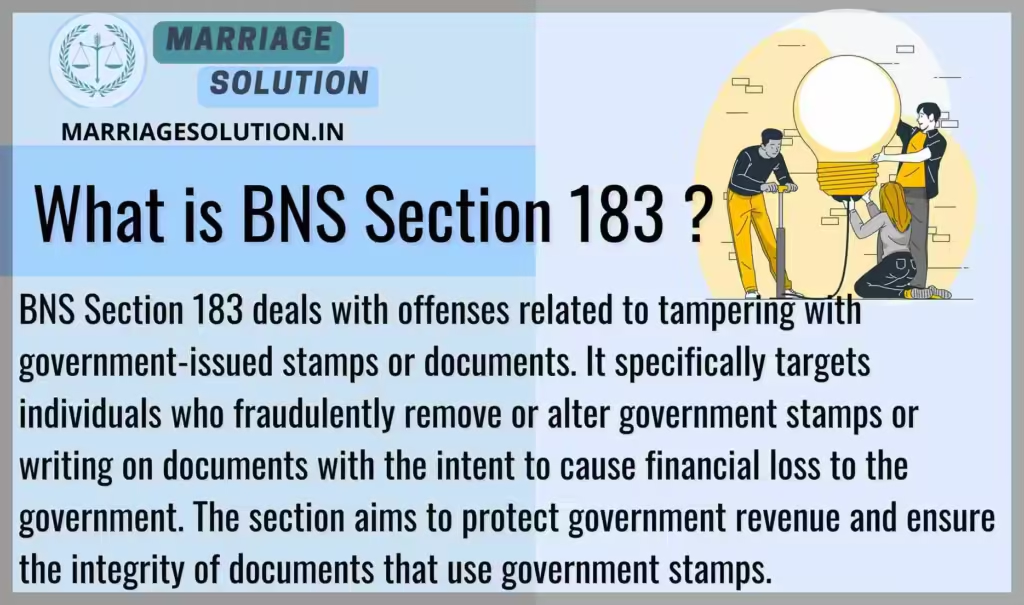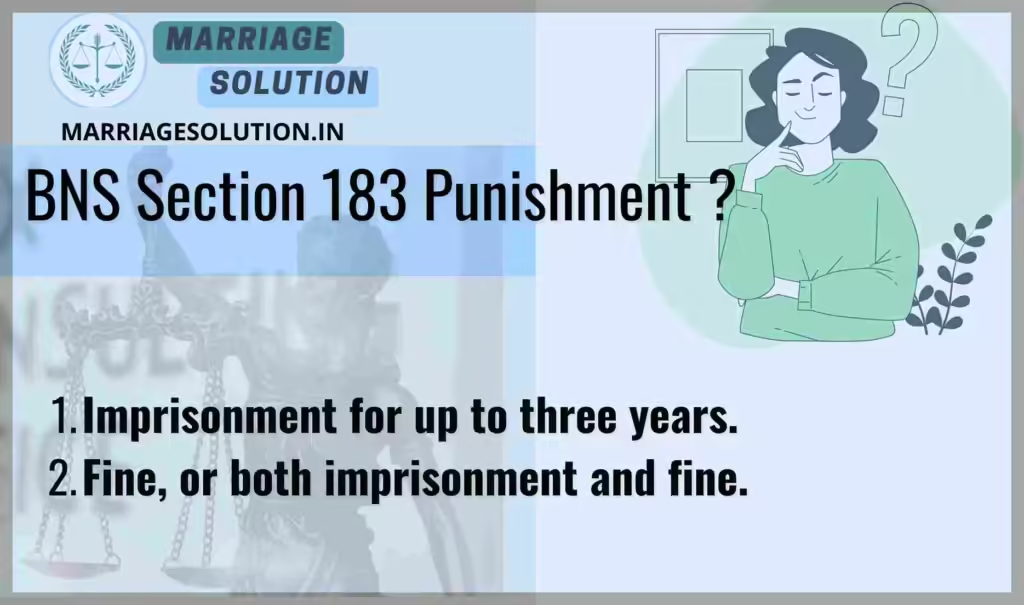Introduction of BNS 183
BNS 183 is a safeguard against fraud involving Government revenue stamps. It penalizes anyone who removes, tampers with, or reuses Government stamps with the intention of causing financial loss to the Government. This provision ensures the authenticity of official documents and protects Government revenue by discouraging fraudulent practices.
The Bharatiya Nyaya Sanhita (BNS) Section 183 replaces the old Indian Penal Code (IPC) Section 261.
What is BNS Section 183 ?
BNS Section 183 deals with offenses related to tampering with government-issued stamps or documents. It specifically targets individuals who fraudulently remove or alter government stamps or writing on documents with the intent to cause financial loss to the government. The section aims to protect government revenue and ensure the integrity of documents that use government stamps.

BNS Section 183 : Removing government stamp law India
“Whoever, fraudulently or with intent to cause loss to the Government, effaces, removes or attempts to reuse a Government stamp already used, or removes any writing from a substance bearing such a stamp, shall be punished with imprisonment for a term which may extend to three years, or with fine, or with both.”
1. Meaning of the Section
This section prevents fraud involving Government revenue stamps. Stamps are issued to certify payments like registration fees, legal taxes, or duties.
If a person removes, tampers with, or reuses such a stamp to cheat the Government and avoid paying fees again, they are guilty under this law.
In simple words → No person is allowed to erase, scrape, or re-use Government stamps because it results in loss of revenue to the State.
2. Who is Covered?
- Individuals → Anyone who tampers with stamps on documents.
- Businesses → Shops, printers, or dealers misusing used stamps.
- Property Buyers/Sellers → People trying to save money by reusing stamps on legal deeds.
Basically, any person who fraudulently alters or reuses a Government stamp is punishable.
3. Nature of the Offense
- Cognizable → Police can register a case and arrest without a warrant.
- Bailable → The accused can apply for bail and may be released during trial.
- Non-Compoundable → The case cannot be settled privately between the parties.
- Triable by → Magistrate of the First Class.
4. Key Ingredients of the Offense
For a person to be convicted under BNS 183, three conditions must be proved:
- Effacing or Removing Writing → Erasing words or writings from a paper carrying a Government stamp.
- Removing Used Stamps → Detaching a stamp from one document to reuse it elsewhere.
- Intention to Cause Loss → The action must be fraudulent, i.e., with the intention of cheating the Government of stamp duty.
5. Punishment under Section 183
- Imprisonment → Up to 3 years.
- Fine → Amount decided by the court depending on loss caused.
- Both → In serious cases, both imprisonment and fine may be imposed.
6. Examples of BNS Section 183
- Example 1: Reusing a Stamp
Arjun buys property and instead of paying fresh stamp duty, he removes a revenue stamp from an old deed and pastes it on the new one. This is a punishable offense under Section 183. - Example 2: Effacing Writing
Ravi scrapes off writing from a document already bearing a stamp so that it looks unused and can be sold again. This amounts to stamp tampering. - Example 3 (Not Guilty):
If a stamp gets damaged accidentally while handling (without fraudulent intent), the person is not guilty, as intention to defraud is necessary.
7. Importance of BNS Section 183
- Protects Government Revenue → Prevents loss of money collected through stamp duties.
- Ensures Fairness → Stops people from gaining unfair advantage by reusing stamps.
- Supports Legal Integrity → Maintains the authenticity of stamped documents.
- Acts as Deterrent → Imposes strict punishment to discourage fraud in official dealings.
Section 183 BNS Overview
BNS Section 183 deals with offenses related to tampering with or removing government-issued stamps from documents or writings in a way that could cause financial loss to the government. The section outlines punishments for such fraudulent acts, including imprisonment and fines.
10 Key Points of BNS Section 183:
- Effacing Writing on a Government-Stamped Substance:
- What It Means: This provision applies to cases where a person fraudulently removes or alters any writing on a substance bearing a government-issued revenue stamp.
- Details: This is a serious offense as it involves tampering with a document that could be used for tax or legal purposes, potentially defrauding the government.
- Removing a Stamp from a Document with the Intent to Reuse:
- What It Means: It prohibits the removal of a stamp that has already been used on a document, with the intent to reuse it on another document.
- Details: This act is intended to defraud the government by avoiding paying for new stamps, thus causing financial loss.
- Intent to Cause Loss to Government:
- What It Means: For the offense to be complete, the person must have acted with fraudulent intent, specifically intending to cause financial loss to the government.
- Details: This makes the crime an intentional act of fraud, not an accidental or negligent mistake.
- Imprisonment for Offenders:
- What It Means: The punishment for such an act is imprisonment for up to three years.
- Details: This indicates that the offense is considered serious, although not on the same level as violent crimes or those involving large-scale fraud.
- Fine as an Additional Punishment:
- What It Means: In addition to imprisonment, the offender may also face a fine, or in some cases, the punishment could be a fine instead of imprisonment.
- Details: This gives flexibility in sentencing, allowing the courts to impose lighter penalties where appropriate.
- Cognizable Offense:
- What It Means: The offense is classified as cognizable, meaning that police officers can arrest the accused without a warrant and start an investigation without the need for a magistrate’s permission.
- Details: This classification reflects the seriousness of the crime, allowing for swift action by law enforcement.
- Bailable Offense:
- What It Means: Despite its seriousness, the offense is bailable, meaning the accused has the right to apply for bail and be released while awaiting trial.
- Details: This ensures that the accused does not necessarily have to remain in custody while the legal proceedings unfold.
- Non-Compoundable Offense:
- What It Means: The offense is non-compoundable, meaning that the parties involved cannot settle the case outside of court. The legal process must be followed through to a conclusion.
- Details: This prevents individuals from privately settling cases that involve defrauding the government.
- Trial by Magistrate of First Class:
- What It Means: Cases under this section are triable by a Magistrate of the first class, meaning that lower courts handle the matter rather than higher courts like the Sessions Court.
- Details: This ensures a quicker trial process for cases of this nature, which are important but not overly complex.
- Protection of Government Revenue:
- What It Means: The section is primarily aimed at protecting government revenue by ensuring that stamps meant for one document are not fraudulently reused on another.
- Details: This ensures that the government collects the necessary fees for services such as registration, taxation, and other administrative processes.
2 Examples of BNS Section 183:
- Example 1:
- A person receives a legal document that requires a revenue stamp. Instead of purchasing a new stamp, they carefully remove the stamp from an old document and place it on the new one. This act of reusing a government-issued stamp to avoid paying for another one falls under BNS Section 183 and is punishable by imprisonment or fine.
- Example 2:
- An individual buys an old document with a government stamp, scrapes off the writing on the document, and resells it with the stamp intact. By doing this, the person tries to use the stamp for a new purpose, thereby defrauding the government of the revenue it would have earned from a new stamp.
BNS 183 Punishment
- Punishment:
- Imprisonment for up to three years.
- Fine, or both imprisonment and fine..

BNS 183 bailable or not ?
Bailable, meaning the accused can secure bail without the court’s discretion, ensuring the right to temporary freedom during the trial.
Comparison Table – BNS 183 vs IPC 261
| Section | What it Means | Punishment | Bail | Cognizable? | Trial By |
|---|---|---|---|---|---|
| BNS Section 183 | This section punishes anyone who removes, erases, or reuses a government stamp or writing on a stamped document to cheat the government. | Jail up to 3 years, or fine, or both. | Bailable (accused can get bail) | Cognizable (police can arrest without warrant) | Magistrate of the First Class |
| IPC Section 261 (Old) | Earlier law for the same offense — removing or altering stamps from documents to defraud the government of revenue. | Jail up to 3 years, or fine, or both (same as BNS 183). | Bailable | Cognizable | Magistrate of the First Class |
BNS Section 183 FAQs
What is the main purpose of BNS Section 183?
It aims to prevent fraud related to government-issued stamps by prohibiting their removal, reuse, or tampering to avoid government revenue loss.
What is the punishment under BNS Section 183?
The punishment can be imprisonment for up to three years, a fine, or both.
Is the offense under BNS Section 183 bailable?
Yes, the offense is bailable, meaning the accused can secure bail and avoid remaining in custody during the trial.
What kind of BNS 183 offense is it—cognizable or non-cognizable?
It is a cognizable offense, meaning the police can arrest the accused without a warrant.
Who can try the cases under this BNS section 183 ?
The cases are triable by a Magistrate of the first class, ensuring that lower courts can handle the proceedings.
Conclusion
BNS Section 183 plays an important role in maintaining the integrity of official documents and protecting Government revenue. By penalizing the fraudulent removal or reuse of Government stamps, the law ensures transparency and prevents loss of revenue to the State. While its roots lie in IPC Section 263, the updated provision under BNS makes the law clearer and more relevant to present-day requirements. It highlights the seriousness of stamp-related fraud and enforces accountability through imprisonment, fines, or both.
Need Legal Support?
If you are dealing with court cases, marriage problems, or any other legal issue, our team at Marriage Solution – Lawyer Help is here for you. Simply fill out our quick online enquiry form, and we’ll connect you with the right legal expert to support your needs.
Finished with BNS 183 ? Continue exploring the next provisions of the Bharatiya Nyaya Sanhita (BNS), 2023. Each section includes explanations, examples, and plain-language breakdowns for easy understanding.
- BNS 184 : Using Government stamp known to have been before used.
- https://marriagesolution.in/bns_section/bns-184/
- BNS 185 : Erasure of mark denoting that stamp has been used.
- https://marriagesolution.in/bns_section/bns-185/
- BNS 186 : Prohibition of fictitious stamps.
- https://marriagesolution.in/bns_section/bns-186/
- BNS 187 : Person employed in mint causing coin to be of different weight or composition from that fixed by law.
- https://marriagesolution.in/bns_section/bns-187/
- BNS 188 : Unlawfully taking coining instrument from mint.
- https://marriagesolution.in/bns_section/bns-188/
Full IPC Section List: https://marriagesolution.in/ipc-section-list
All Indian Law & Blogs: https://marriagesolution.in/indian-law/
Full BNSS Section List: https://marriagesolution.in/bnss_section-list
